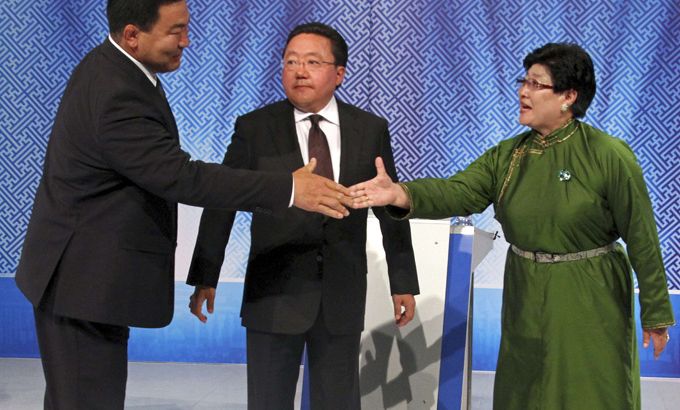Polls close in Mongolia presidential election
Results awaited in election that pitted incumbent against ex-wrestler and a woman in landlocked Central Asian country.

Voting has closed in Mongolia’s presidential election, which has pitted the incumbent against a former wrestler and a woman, amid calls for a fairer wealth distribution from a mining boom that has raised questions over the role of foreign investors.
Polls closed at 10:00pm local time (1400 GMT) on Wednesday, and while results could arrive overnight, and any candidate that wins more than 50 percent of the vote will claim victory and avoid a run-off on July 10.
All three candidates claim they want to ensure a fair distribution of wealth in Mongolia, a remote, landlocked nation.
Recent polls suggest that President Tsakhia Elbegdorj will secure a second term to continue his policy of using foreign cash to help drive the rapid development of Mongolia’s economy, which grew by 17.5 percent in 2011 and 12.3 percent last year.
The expansion has been achieved after the arrival of foreign mining giants, which have moved in to exploit huge and largely untapped reserves of coal, copper and gold, especially at the southern Oyu Tolgoi mine.
Concerns over rising inequality in the cities and environmental damage in the rural areas continue to dominate debate in the country’s parliament.
Elbegdorj’s main challenger is likely to be Badmaanyambuu Bat-Erdene, a champion wrestler and candidate from the Mongolian People’s Party (MPP).
First female contestant
The third candidate, Natsag Udval, from the Mongolian People’s Revolutionary Party (MPRP), is reportedly Mongolia’s first female presidential candidate.
Udval is a supporter of former President Nambar Enkhbayar, who is serving a two-and-half year jail term on corruption charges.
Bat-Erdene helped draw up a new environmental protection law amid concerns that the country’s landscape was being damaged by industry.
Both of Elbegdorj’s challengers harbour policies aimed at amending Oyu Tolgoi’s contract amid concerns over rampant development and inequality.
A survey carried out between June 14-16 by the Ulaanbaatar-based Sant Maral Foundation, a traditional stronghold of the ruling Democratic Party, suggested that 54 percent of Mongolians will vote for Elbegdorj.
The country held its first elections in 1992, signalling a transition to democracy that has been largely peaceful, although accusations of vote-rigging in 2008 parliamentary elections resulted in deadly riots.
Mongolia ended seven decades of communist rule in 1990 without a shot being fired.